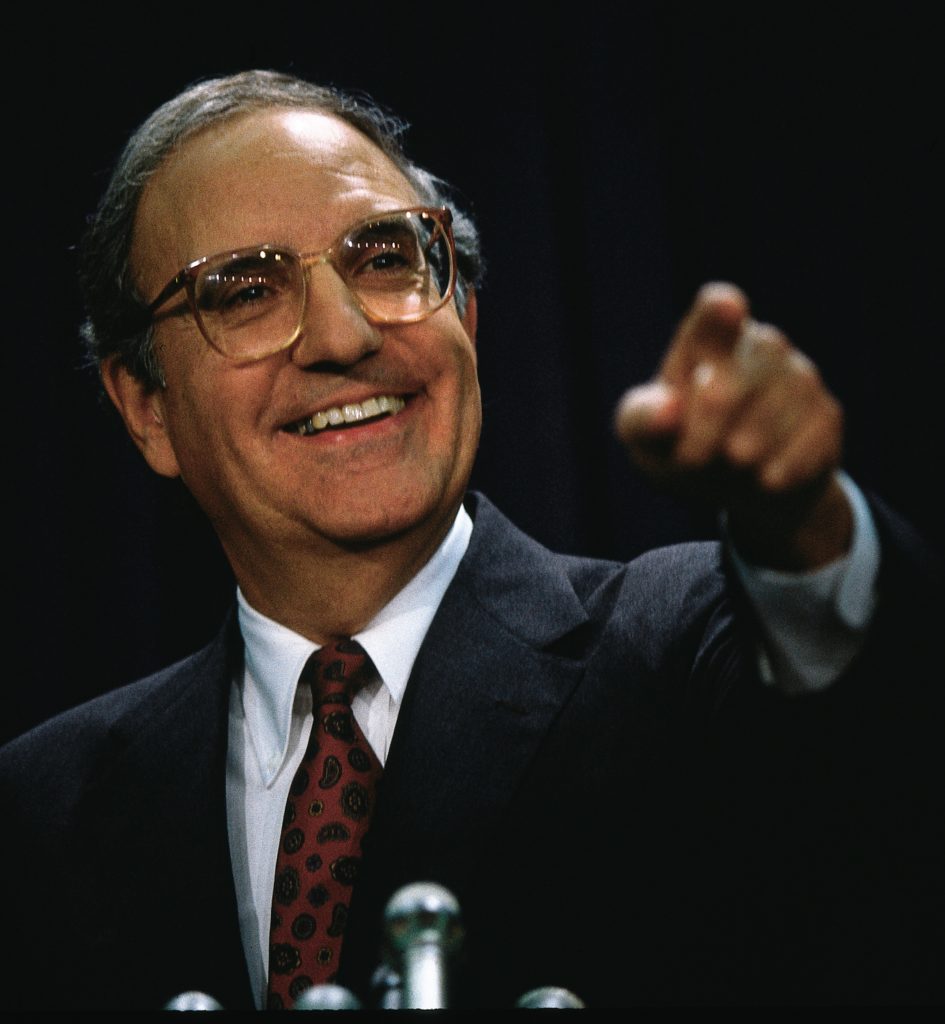There would not have been a peace agreement on Good Friday 1998 without George Mitchell. Sinn Féin leader Gerry Adams reflects the views of most Irish nationalists when he says: “Senator Mitchell’s role was indispensable to the success of the negotiation process and to the securing of the Good Friday Agreement. There can be no doubt that without his patience and stamina the outcome could have been very much different.”
On the unionist side, David Kerr, press secretary for David Trimble, also praised Mitchell’s role and the way he conduct-ed himself in the multi-party talks. “He was extremely capable and fair: a genuine person who gave everything he had to making the process work. He acquitted himself very well and did the American people proud. I don’t think anybody else could have done what he did, it was a remarkable political balancing act.”
President Clinton appointed Mitchell, a former U.S. senator from Maine, first as economic advisor and then as chair of the Northern Ireland peace negotiations. He spoke to Irish America in 1995, shortly after his appointment as economics advisor.
What made you consider this unpaid position [economic advisor] when many jobs were open to you?
Somebody asked me recently why was I spending so much time at this since it was an unpaid position. I said it’s a labor of love, and I meant it. I truly enjoy it. I admire the participants, and I think that it’s an opportunity, for me as an Irish-American, to play a role in what I think is an historic event. I have enjoyed reading many books on English and Irish history in preparation for this assignment and I really believe this is a moment of historic opportunity that could be the framework for life in Ireland for not just a few years but decades, or perhaps even centuries. It’s a historic time, and a tremendous opportunity to make some progress.
What was the atmosphere in Northern Ireland like on your visit?
There was, it seemed to me, a real genuine, tangible enthusiasm about the absence of violence, about the opportunity to lead normal lives and a desire to move forward with the peace process and also very positive feeling toward President Clinton and the effort being made by the United States. It’s unfortunate that very few Americans are aware of the role that the President has played in this effort. Yet when you go over to Ireland, everyone states it and acknowledges it, and people are very generally aware of and recognize the crucial role played by the Clinton administration.
Do you think the Adams visa was crucial to the peace process?
The President made the right decision at each stage of the process and by his actions has encouraged progress towards peace. I think his timing has been right, and his actions, while obviously difficult and controversial, have been correct.
Tell me about your own Irish background.
My father’s parents were born in Ireland and emigrated to the United States just before the turn of the century, some time in the 1890s, we think. The name was Kilroy. My father was born in Boston in 1900 and never knew his parents. All the children were raised in a Catholic orphanage in Boston. Apparently what happened is that the mother died and the father couldn’t care for them and put them in an orphanage. My father was adopted when he was four by an elderly, childless couple who lived in Bangor, Maine. They changed his name to Mitchell – his name at birth was Joseph Kilroy and shortly thereafter moved to Waterville, Maine, where I grew up. My father’s older brother Francis was also adopted by a family from Portland, Maine, but he later made contact with my father, and the families became quite friendly, and we have had regular contact over many years.
Tell me about the early Irish settlements in Maine.
There was a downturn in the Irish economy in 1829 and 1830, often called the small famine, and a lot of them came over and landed at Grosse Ile in Canada. They had no means of transport and so they walked to the United States and they walked through Maine. There was a lot of violence along the Maine border in 1830, and a number of them stayed in Maine, in fact, there was quite a substantial settlement, while many more went on to Boston. So I’m quite familiar with Grosse Ile. It led to the first large wave of Irish immigration into Maine.
Do you hope to get back to Ireland soon?
Yes. One of my objectives is to return at a time when I can simply enjoy it. That is to say, not on a business trip, on a pleasure trip, on a vacation. I really enjoyed meeting and talking with the people.


Leave a Reply